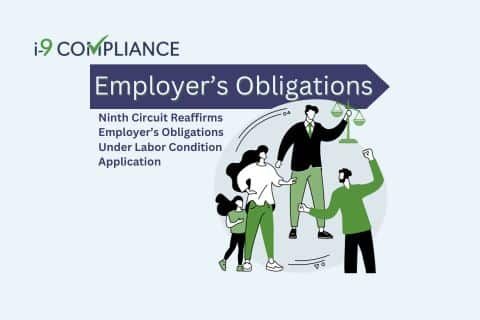Ninth Circuit Reaffirms Employer’s Obligations Under Labor Condition Application

October 6, 2023
The U.S. Court of Appeals for the Ninth Circuit recently affirmed that employers must adhere to the Labor Condition Application (LCA). The LCA outlined wages employers must pay foreign national workers throughout their authorized employment. According to the court, this obligation continues regardless of the employee’s location or productivity. However, it also provides limited exceptions.
In this case, the employer was a television station hiring an Australian citizen on an E-3 work visa status. The employer filed an LCA with the Department of Labor (DOL) as a condition of hiring a foreign national worker. The LCA set out basic information, including the dates of employment and the gross wage rate, which the DOL subsequently certified.
The employee worked in E-3 status for the employer in the United States. During his employment, the company obtained certification for two distinct LCAs. In 2011, the first LCA certification provided a salary of $45,000. The second offered an increase to $60,000 in 2013 and expired in September 2015. However, the foreign national worker filed an administrative complaint with the DOL in February 2015. The worker claimed the employer failed to pay the wages specified in either LCA.
As neither party contested the allegations, the DOL’s Administrative Review Board found that the employer had violated the LCAs. As a result, the DOL ordered the employer to pay back wages. The employer attempted to appeal this decision to a federal district court, which upheld the ruling. This affirmation led to a Petition for Review with the Court of Appeals for the Ninth Circuit. However, the Appeals Court also affirmed the lower court’s decision.
In its decision, the court explained that LCAs have only two exemptions to the rule for paying an E-3 worker the outlined wages during their employment: If the employee becomes non-productive due to personal reasons or if there is a bona fide termination. Examples of personal reasons include vacation or health issues.
In this case, the employer informed the plaintiff they could not pay the wages. However, they did not officially terminate the worker’s employment. As a result, the court revealed that the employer retained responsibility for paying back wages to the amount specified in the LCA.
As this case shows, employers must pay careful attention to documentation requirements. Nowhere is this more true than in the employment eligibility verification (Form I-9) process. Employers must complete and retain I-9 documentation in compliance with the Immigration and Nationality Act for every employee.
The best way to remain compliant is to invest in an electronic I-9 management system. This system can guide employers through every step and provide a suite of features. Examples include electronic storage and notifications of when to take action.
Ensure compliance today by switching to an electronic I-9 management tool with I-9Compliance.